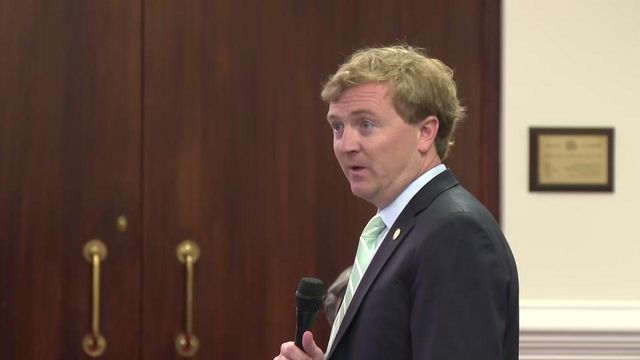Changes at UNC, ECU could cost NC pension plan $1 billion or more, state treasurer says

New changes coming to the massive state-owned hospital systems run by the University of North Carolina and East Carolina University could allow them to better compete with the private sector on hiring and keeping employees — by allowing for new retirement benefits, outside the ones normally offered by the state.
But those same changes could also endanger the State Health Plan and pension system, some state officials say. Hundreds of thousands of current and former state workers, and their families, rely on those plans for their health care and retirement benefits.
The changes could blow a billion-dollar hole in the solvency of the state retirement system when they become law in January, North Carolina Treasurer Dale Folwell’s office claims in a letter sent this month to ECU and UNC.
The letter, obtained by WRAL, also claims the universities are at risk of violating federal tax laws and could expose not just themselves but the entire state pension plan to scrutiny — and possible penalties — from the Internal Revenue Service.
UNC and ECU disagree. They’ve been lobbying for the changes and convinced Republican legislative leaders to include them in the new state budget — despite heavy opposition by groups that represent current and retired state workers, and by Folwell, an accountant and former high-ranking state lawmaker himself.
“We disagree that these changes will hurt the state,” UNC Health spokesman Alan Wolf said. “In fact, we believe they will save taxpayers money. If UNC Health chooses to hire new employees in the future under a new benefits plan, it will cost taxpayers less. The state won’t be on the hook for retirement funding and the cost of those new employees’ health care.”
The North Carolina Healthcare Association, which lobbies on behalf of hospitals, declined to comment on the new changes or Folwell’s critiques.
Critics say UNC Health’s argument ignores what it means to remove thousands of UNC and ECU health care workers from the state retirement system.
The retirement system works like this: State workers contribute 6% of each paycheck toward the pension fund. Then the treasurer’s office invests it in stocks or other financial products hoping to grow those investments. That pool of money is ultimately distributed to retired state workers. When state employees retire, the pension plan pays them a monthly stipend for the rest of their lives.
Folwell fears for the plan’s stability, since the new changes taking UNC and ECU health employees out of the retirement system will mean thousands fewer people paying into the system. Folwell said the impact from UNC alone could be $1 billion, while ECU poses a smaller but still substantial sum.
Compounding the worries: State government agencies are also having increased difficulty filling vacant positions. In many agencies 20% or more of jobs are unfilled, which also threatens the stability of the pension plan.
“We’ve got fewer people paying in, and more people nearing retirement,” said Suzanne Beasley, a lobbyist for the State Employees Association of North Carolina. “There’s a real concern.”
Folwell, a Republican who’s running for governor, has made the health care industry a political target of his since first becoming treasurer in 2017, often accusing hospitals and insurers of lacking transparency and charging unfair prices, particularly to the State Health Plan.
But he said his concerns about UNC and ECU have nothing to do with politics.
“To think that you’re going to save money at UNC Health Care — on the backs of every other governmental agency who’s participating in this plan — and not pay the over $1 billion that you owe as you try to divorce from the state health plan?” he said. “It’s not Republican or Democrat. It’s immoral.”
Lack of transparency
The law instructs the two university health systems to create their own new retirement plans, which will be mandatory for anyone who’s hired after Jan. 1. Current employees could also be allowed to sign up for the new plans and leave the state retirement system, too, but it wouldn't be required.
The details of those new plans, if they exist, aren’t public knowledge. UNC Health declined to make any officials available for an interview about the topic.
Another unanswered question is whether the thousands of workers who will be affected know about the coming changes. Beasley said she and her coworkers at SEANC have gotten almost no calls about it from their members who work for the university health systems, indicating that people probably are unaware.
“I don’t know how well it’s been communicated with the employees,” Beasley said. “Because at this point I’m not sure if they even have a plan themselves. If they do, they’re not sharing it.”
The new changes became law with little public debate. A similar version of the proposal passed the state Senate in April but was immediately killed in the state House. In September it popped back up in the budget, which was written in secret and passed into law with no opportunities for amendments or public comment.
Folwell criticized state lawmakers and health care leaders alike for the process.
“If you look at this high degree of secrecy, and this lack of transparency, it would not shock me that the current employees aren’t aware of what’s going on,” Folwell said.
Senate Republicans dispute that characterization of a secretive process, pointing to the debates earlier in the year over the initial version of the proposal.
New flexibility, or too much risk?
The new law also instructs UNC and ECU to work together to tackle issues in rural health care. Its lead backer at the state legislature, Sen. Ralph Hise, R-Mitchell, told WRAL in June that’s his main focus.
“I’m trying to create more options out there across the state for individuals to receive their healthcare,” Hise said.
Hise didn’t immediately respond to a request for comment about the concerns Folwell is now publicly raising — although UNC and ECU officials said the legislature already was aware of Folwell’s complaints and ultimately didn’t find them concerning.
“Our understanding is the concerns noted in the letter were previously reviewed and considered by legislators before passage,” ECU Health spokeswoman Ashlin Elliot said. “ECU Health does not anticipate these changes will negatively impact the state of North Carolina.”
An earlier version of the law faced opposition from federal regulators and private experts, who said it would violate antitrust laws, WRAL previously reported. The version that became law this month appears to address those legal concerns, some critics have said. But opponents say it didn’t address their concerns about the finances of the broader state retirement system.
“At the end of the day, really no one’s going to win on this,” said Tim O’Connell, who leads the North Carolina Retired Governmental Employees’ Association. “Rural health will not. State employees will not. The pension plan will not. Taxpayers will not.”
North Carolina won’t be the first state to change up retirement rules for a large set of state employees. A similar change in Alaska has led to worse retirement benefits, according to local media and trade publications. The Alaska Beacon reported in February that the average state retiree there would be receiving $4,000 more per year in pension benefits if the changes had never been approved.
O’Connell has closely followed the Alaska example, which has threatened that state’s ability to hire and retain employees. “They’re not going to recover for 25 years,” he said. “They really miscalculated it.”
The new North Carolina law also doesn’t do enough, Folwell said, to make sure that UNC and ECU don’t violate federal tax laws when they create their new retirement systems. It would be illegal, he said, for them to create new systems that differ from what the state already offers. Folwell said neither university appears interested in working with him to address those concerns, however. Neither has responded to his letter.
When asked about the letter and its claims, spokespeople for UNC and ECU dismissed Folwell’s concerns.
Yet if UNC or ECU creates a new plan that’s different from the normal state retirement plan, and the IRS decides Folwell is right and the plan does violate federal law, then future punishments could target the entire state retirement system — not just UNC or ECU. Such a punishment isn’t guaranteed, but it’s also not off the table.
“You can’t just decide not to follow the rules and laws,” said Beasley, the SEANC lobbyist.
“If they do that,” she added, “we are not in compliance with federal IRS laws — which jeopardizes everything.
“The whole state. This whole thing is a mess, at best.”
Lawyers for the universities and their hospitals have been working on the proposal for a long time. The official line is that they see nothing to worry about. The state legislature doesn’t appear to be concerned either, spokespeople for UNC and ECU both said, otherwise the proposal wouldn’t have been passed into law.
“ECU Health does not anticipate any impacts to state employees within our enterprise as a result of the flexibilities granted by the legislature in the recent budget,” Elliott, the ECU Health spokeswoman, said.














